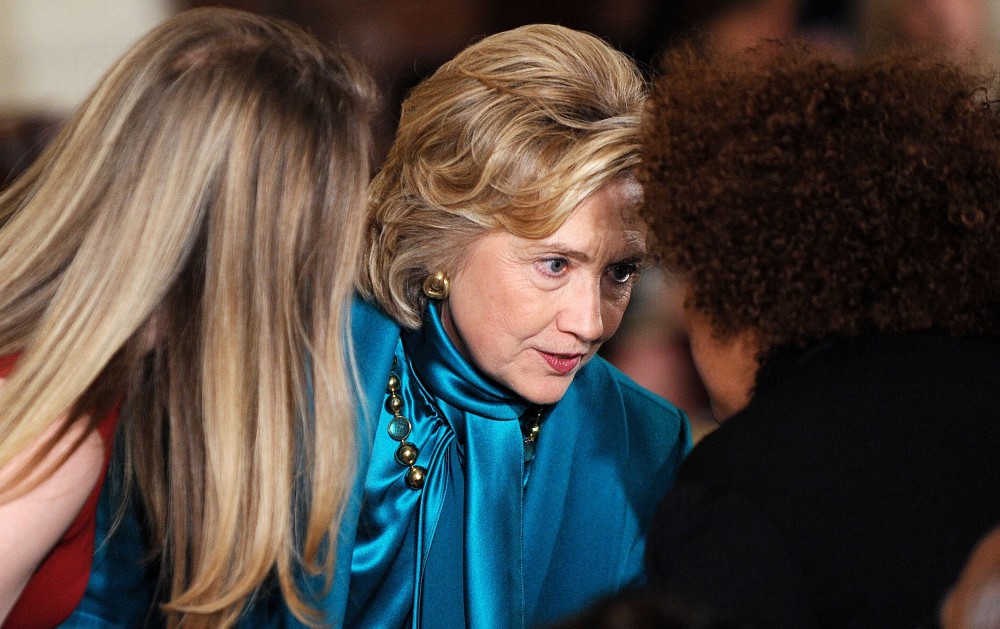(Opinion)
By Doyle McManus
Los Angeles Times.
Hillary Rodham Clinton sure sounds like a woman who wants to run for president.
“If you really want to do something, if you believe you’re the right person to do it, if you think that it could make a difference, then you have to be willing to compete, to get into the arena,” she told an audience at Simmons College last week.
And women in their 60s aren’t too old to be effective, she added. Far from it. At that age, “women are raring to go because they feel like they’ve fulfilled their responsibilities, their kids are now on their own, it’s now time for them to show what they can do.”
Plenty of Democrats hope Clinton heeds her own words. She holds a gigantic lead in early polls over Vice President Joe Biden, her closest potential competitor for their party’s nomination.
No fewer than four political action committees are already working on her behalf, raising money and collecting names of supporters. If she decides to run, a decision she says she’ll make later this year, launching her campaign will be like turning a switch on a machine that’s already built.
But what if Clinton decides not to run?
Then her party has a problem: It needs to find another nominee, one who won’t suffer in the eyes of voters by comparison to the one who got away.
Clinton says she hasn’t made up her mind, and people who know her insist that she’s telling the truth. “I can see reasons she might take a pass,” said Mike McCurry, the former press secretary to Bill Clinton. But McCurry jokes that he’s in “the last 5 percent” of Washington insiders who think Clinton won’t run.
There’s no shortage of other potential Democratic nominees. Biden, 71, remains widely popular among Democrats despite his gaffe-prone image. Massachusetts Sen. Elizabeth Warren says she isn’t running, but she has captured the hearts of progressives with her scorching denunciations of Wall Street. New York Gov. Andrew Cuomo is likely to win solid reelection in one of the nation’s biggest states, with support from Wall Street. Maryland Gov. Martin O’Malley and former Montana Gov. Brian Schweitzer say they might try for the nomination as well.
But none of them can make much headway in impressing voters, or raising money from donors, as long as Clinton fills the space labeled “presumptive nominee.”
“She’s Gladys Knight and all the rest of them are Pips,” Democratic donor Robert Zimmerman told the Wall Street Journal recently.
“It’s just about impossible for the rest of them to generate money, support or serious interest,” agreed a Democratic campaign strategist who talked with me on condition he not be identified. “And the longer she’s potentially in it, the smaller they all look, because she’s the only one people care about.”
Polling suggests he’s right. O’Malley has been talking about running for president for more than a year, but a recent survey found that most Democrats in Iowa had never heard of him. His political action committee has raised about $700,000, but that’s about 12 percent of the amount raised by Ready for Hillary, a shadow “super PAC” formed by her eager supporters.
“For the good of the party, it’s better if she makes the decision earlier,” the strategist advised. “If she isn’t going to run, the other candidates need some time to build their stature.”
But an early decision may not be in Clinton’s personal interest, especially if her answer is yes.
“The moment she decides to run, the whole tone and tenor of her media coverage will change, for the worse,” the strategist noted.
Instead of her gauzy current role as a former secretary of State, inspirational speaker and grandmother-in-waiting, candidate Clinton would face demands to defend her record in office and say how she’d differ from Barack Obama.
It may seem impatient and even a little unfair to be asking Clinton to make up her mind this early. Two years ought to be more than enough time to run for president; the traditional time to announce candidacies is early in the year before election day, in this case, 2015.
But two years isn’t enough anymore. These days, successful candidates lay their groundwork long in advance. By the time they announced their 2008 candidacies in early 2007, Clinton and Obama already had professional staffs and dozens of donors.
The 2016 presidential election will probably be difficult for any Democratic nominee, including Clinton. After eight years of Obama, voters may be looking for a change in parties.
Since World War II, a party has won the White House in three consecutive elections only once, when George H.W. Bush succeeded Ronald Reagan in 1988.
Clinton probably stands the strongest chance of beating that trend. She’s popular among Democrats and independents, she’s run for president before and she’d offer the allure of breaking a glass ceiling.
But first she has to decide. If she does plan to run, little will be lost from delaying the announcement until the end of the year. But if she opts not to run, she owes it to her party to make that decision sooner.
Otherwise, she risks going down in history as a candidate who helped her party snatch defeat from the jaws of victory in 2016.
___
ABOUT THE WRITER
Doyle McManus is a columnist for The Los Angeles Times.














































































































































































































































































































































































